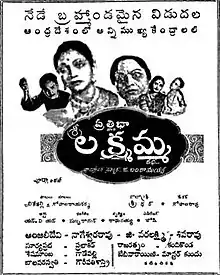Sri Lakshmamma Katha
Sri Lakshmamma Katha (transl. Story of Sri Lakshmamma) is a 1950 Telugu-language Hindu mythological film, produced and directed by Ghantasala Balaramaiah under the Pratibha Productions banner.[2] It stars Akkineni Nageswara Rao, Anjali Devi [3] and music composed by C. R. Subburaman.[4]
| Sri Lakshmamma Katha | |
|---|---|
 Theatrical release poster | |
| Directed by | Ghantasala Balaramaiah |
| Produced by | Ghantasala Balaramaiah |
| Written by | Balijepalli Lakshmikantham Gopalaraya Sharma (dialogues) |
| Starring | Akkineni Nageswara Rao Anjali Devi |
| Music by | C. R. Subburaman |
| Cinematography | P. Sridhar |
| Edited by | G. D. Joshi |
Production company | Pratibha Productions[1] |
| Distributed by | Poorna films |
Release date |
|
| Country | India |
| Language | Telugu |
Plot
Lakshmamma (Anjali Devi), a noblewoman, daughter of rich landlord Musalappa Naidu (Gadepalli) who is head of their village Durgi. She lives very happily along with her mother Peramma (Rajaratnam) and brothers Kotaiah Naidu (Prabhakar Rao) & Chinna Kotaiah Naidu (Master Kundu). On the other side, Venkaiah Naidu (Akkineni Nageswara Rao) belongs to Lingapuram, stays along with two elder brothers Subbaiah Naidu (Kandikonda) & Ramaiah Naidu (Gowrinatha Sastry), mother Venkamma (Seshamamba) and sister Pichamma (G. Varalakshmi) who left her husband. Once Venkaiah visits Durgi where he sees Lakshmamma and falls in love with her. Here Musalappa keeps a condition that the bridegroom must stay along with them. Even though his mother & sister objects it with his brothers' support Venkaiah marries Lakshmamma. Time passes, Lakshmamma gives birth to a baby girl and she is named as Parvathi (Baby Narayani). Meanwhile, Venkaiah gets attracted towards a temple dancer Rangasani (Suryaprabha). One night when he is trying to steal Lakshmamma necklace for Rangasani, she obstructs him, he beats her very badly and leaves to his house. Kotaiah goes to bring back him but in turn, he is insulted. Now Lakshmamma goes to her in-law's house where she is deserted by her womanizing husband and is subjected to many hardships by her mother-in-law & sister-in-law. Once a hidden treasure is dug out by Lakshmamma, on this occasion Subbaiah & Ramaiah leaves to Kotappakonda temple along with their wives. At that time, Venkamma wants to make Parvathi's marriage with Pichamma's mad son for which Lakshmamma does not agree. Parallelly, Venkaiah sees Rangasani with some other person. In that anger he returns home when Venkamma & Pichamma make a bad propaganda on Lakshmamma and makes him suspect her chastity. Venkaiah stabs Lakshmamma with the knife when a lighting occurs, Venkaiah loses his eyesight and Venkamma & Pichamma becomes dumb. At last, Lakshmamma makes them normal with her devotional power. Finally, Lakshmamma is adored as a deity at Lingapuram.
Cast
- Akkineni Nageswara Rao as Venkaiah Naidu
- Anjali Devi as Sri Lakshmamma
- Kasturi Siva Rao as Rangadu
- Kona Prabhakar Rao as Kotaiah Naidu
- Gadepalli as Musalappa Naidu
- Gowrinatha Sastry as Ramaiah Naidu
- Kandikonda as Subbaiah Naidu
- G. Varalakshmi as Pichamma
- Surabhi Balasaraswathi as Chitti
- Suryaprabha as Rangasani
- Seshamamba as Venkamma
- Rajaratnam as Peramma
- Kanthamma as Viswamaata
- Master Kundu as Chinna Kotaiah Naidu
- Baby Narayani as Parvathi
Crew
- Art: S. V. S. Rama Rao
- Choreography: Vedantam Raghavaiah
- Dialogues — Lyrics: Balijepalli Lakshmikantham, Gopalaraya Sharma
- Playback: Susarla Dakshinamurthi, P. Leela, Jikki, C. R. Subburaman, Kasturi Siva Rao,
- Music: C. R. Subburaman
- Editing: G. D. Joshi
- Cinematography: P. Sridhar
- Producer — Director: Ghantasala Balaramaiah
- Banner: Pratibha Productions
- Release Date: 26 February 1950
Soundtrack
| Sri Lakshmamma Katha | |
|---|---|
| Film score by | |
| Released | 1950 |
| Genre | Soundtrack |
| Length | 28:45 |
| Producer | C. R. Subburaman |
Music composed by C. R. Subburaman. Lyrics were written by Balijepalli Lakshmikantham, Gopalaraya Sharma. Music released on Audio Company.[5]
| S. No. | Song Title | Singers | length |
|---|---|---|---|
| 1 | "Annem Punnem Yerugani" | C. R. Subburaman | 4:22 |
| 2 | "Cheetiki Maatiki Chittemmante" | Jikki, Kasturi Siva Rao | 2:04 |
| 3 | "Chinnari Bangaru" | P. Leela | 3:05 |
| 4 | "Gummadi Poola Kammani Gaali" | P. Leela | 2:54 |
| 5 | "Hayiga Veenula Vinduga" | Susarla Dakshinamurthi, P. Leela | 3:14 |
| 6 | "Idi Naa Vidhi Krutama" | P. Leela | 3:28 |
| 7 | "Jeevithame Vrudha Auno" | P. Leela | 3:15 |
| 8 | "Nattinta Maa Lakshmi" | P. Leela | 1:39 |
| 9 | "Thaalaga Jaalanu Ra" | A. P. Komala | 2:50 |
| 10 | "Velpuvai Velisevu" | Chorus | 1:54 |
References
- "Sri Lakshmamma Katha (Overview)". IMDb.
- "Sri Lakshmamma Katha (Banner)". Chitr.com.
- "Sri Lakshmamma Katha (Cast & Crew)". Know Your Films.
- "Sri Lakshmamma Katha (Review)". Spicy Onion.
- "Sri Lakshmamma Katha (Songs)". Cineradham.